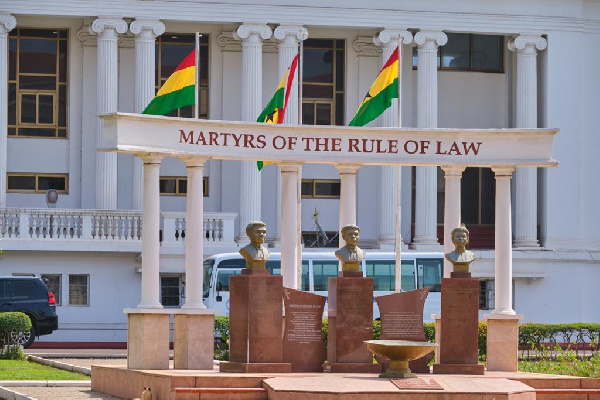Secretly recording a telephone conversation with others is a breach of their right to privacy, unconstitutional, inadmissible - Supreme Court
"To allow such deliberate violation of rights would encourage litigants to sidestep the rules of evidence and thereby undermine the integrity of court proceedings and bring the administration of justice into disrepute. "

The Supreme Court of Ghana has held that one’s secret recording of a conversation in which he /she is a party amounts to a breach of the other's right to privacy, unconstitutional, and the same evidence is not admissible.
According to the apex court, a plaintiff would have alternative means of adducing evidence in proof of his/her case and thus should not be allowed to benefit from the intentional violation of the human rights of his opponent in a case.
The court, in a unanimous decision read by Justice Gabriel Pwamang, made this declaration in a land case referred to it by the Sunyani District Court “A” in which a contention arose when the plaintiff decided to tender in evidence, an audio recording of a telephone conversation he had with the 3rd defendant.
In the course of the case, the plaintiff sought to tender in evidence an audio recording of a telephone conversation he had with one John Felix Yeboah, a Superintendant Minister representing the Assembly of God Church.
The plaintiff claimed that the recorded conversation covered matters that were in contention in the case before the court and he wanted to use it to prove that the Superintendant Minister admitted his side of the case in that conversation.
However, the lawyer for the defendant objected to the tendering of the recording noting among others that it was made surreptitiously by the plaintiff without the consent of John Felix Yeboah and thus amounted to a violation of his right to privacy per Article 18(2) of the Constitution.
In his ruling, the trial Magistrate took the view that he required the guidance of the apex court to determine whether the secret recording amounted to a breach of Article 18(2) and if so whether the recording was to be excluded from the evidence.
The Supreme Court per its judgment took cognizance of an overview of the laws in other countries on the legality of the issue of secret recordings and identified countries such as Canada and Italy where it is legal to record the same without permission. On the other hand, it identified Germany and the US state of Florida where the act is prohibited if done without consent.
It, therefore, concluded per the fact of the first leg of the issue that the secret recording of the Superintendent Minister amounted to a violation of his right to privacy guaranteed by Article 18(2) of the Constitution, 1992.
In resolving the second leg of the question on whether the recording ought to be excluded from evidence despite its content being relevant to the matters in contention, the court noted that where on the facts of a case, a court concludes that the admission of such evidence could bring the administration of justice into disrepute or affect the fairness of the proceedings, then it ought to exclude it.
Further to the above, the court made the finding that the plaintiff secretly recorded the Superintendant Minister intending to use the evidence in court against him thus indicating that to allow such a deliberate violation of rights would encourage litigants to sidestep the rules of evidence and thereby undermine the integrity of court proceedings and bring the administration of justice into disrepute.
It noted also that its conclusion could have been otherwise if there were countervailing factors however per the fact of the instant case, the apex court held that the secret recording ought not to be allowed.
Click the link to read the full case on Dennislaw.


